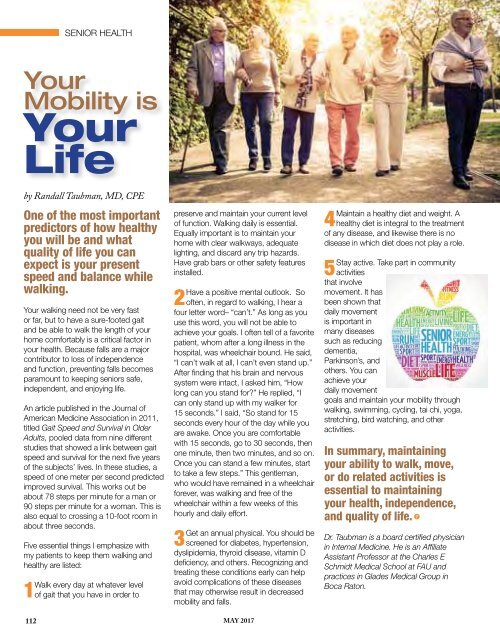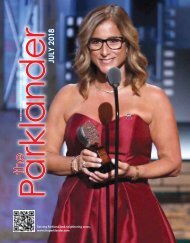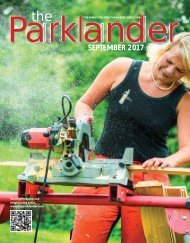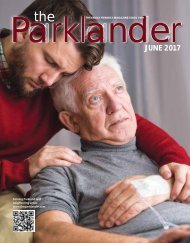May 2017
Create successful ePaper yourself
Turn your PDF publications into a flip-book with our unique Google optimized e-Paper software.
SENIOR HEALTH<br />
Your<br />
Mobility is<br />
Your<br />
Life<br />
by Randall Taubman, MD, CPE<br />
One of the most important<br />
predictors of how healthy<br />
you will be and what<br />
quality of life you can<br />
expect is your present<br />
speed and balance while<br />
walking.<br />
Your walking need not be very fast<br />
or far, but to have a sure-footed gait<br />
and be able to walk the length of your<br />
home comfortably is a critical factor in<br />
your health. Because falls are a major<br />
contributor to loss of independence<br />
and function, preventing falls becomes<br />
paramount to keeping seniors safe,<br />
independent, and enjoying life.<br />
An article published in the Journal of<br />
American Medicine Association in 2011,<br />
titled Gait Speed and Survival in Older<br />
Adults, pooled data from nine different<br />
studies that showed a link between gait<br />
speed and survival for the next five years<br />
of the subjects’ lives. In these studies, a<br />
speed of one meter per second predicted<br />
improved survival. This works out be<br />
about 78 steps per minute for a man or<br />
90 steps per minute for a woman. This is<br />
also equal to crossing a 10-foot room in<br />
about three seconds.<br />
Five essential things I emphasize with<br />
my patients to keep them walking and<br />
healthy are listed:<br />
1Walk every day at whatever level<br />
of gait that you have in order to<br />
112<br />
preserve and maintain your current level<br />
of function. Walking daily is essential.<br />
Equally important is to maintain your<br />
home with clear walkways, adequate<br />
lighting, and discard any trip hazards.<br />
Have grab bars or other safety features<br />
installed.<br />
Have a positive mental outlook. So<br />
2 often, in regard to walking, I hear a<br />
four letter word– “can’t.” As long as you<br />
use this word, you will not be able to<br />
achieve your goals. I often tell of a favorite<br />
patient, whom after a long illness in the<br />
hospital, was wheelchair bound. He said,<br />
“I can’t walk at all, I can’t even stand up.”<br />
After finding that his brain and nervous<br />
system were intact, I asked him, “How<br />
long can you stand for?” He replied, “I<br />
can only stand up with my walker for<br />
15 seconds.” I said, “So stand for 15<br />
seconds every hour of the day while you<br />
are awake. Once you are comfortable<br />
with 15 seconds, go to 30 seconds, then<br />
one minute, then two minutes, and so on.<br />
Once you can stand a few minutes, start<br />
to take a few steps.” This gentleman,<br />
who would have remained in a wheelchair<br />
forever, was walking and free of the<br />
wheelchair within a few weeks of this<br />
hourly and daily effort.<br />
Get an annual physical. You should be<br />
3 screened for diabetes, hypertension,<br />
dyslipidemia, thyroid disease, vitamin D<br />
deficiency, and others. Recognizing and<br />
treating these conditions early can help<br />
avoid complications of these diseases<br />
that may otherwise result in decreased<br />
mobility and falls.<br />
MAY <strong>2017</strong><br />
Maintain a healthy diet and weight. A<br />
4 healthy diet is integral to the treatment<br />
of any disease, and likewise there is no<br />
disease in which diet does not play a role.<br />
Stay active. Take part in community<br />
5 activities<br />
that involve<br />
movement. It has<br />
been shown that<br />
daily movement<br />
is important in<br />
many diseases<br />
such as reducing<br />
dementia,<br />
Parkinson’s, and<br />
others. You can<br />
achieve your<br />
daily movement<br />
goals and maintain your mobility through<br />
walking, swimming, cycling, tai chi, yoga,<br />
stretching, bird watching, and other<br />
activities.<br />
In summary, maintaining<br />
your ability to walk, move,<br />
or do related activities is<br />
essential to maintaining<br />
your health, independence,<br />
and quality of life.<br />
Dr. Taubman is a board certified physician<br />
in Internal Medicine. He is an Affiliate<br />
Assistant Professor at the Charles E<br />
Schmidt Medical School at FAU and<br />
practices in Glades Medical Group in<br />
Boca Raton.

















